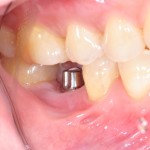
Peri-implantits is a recognised complication of dental implants with a prevalence estimated to be in the order of 18% although variation in definitions of the condition mean that figures vary. Treatment of peri-implantitis is similar to periodontitis with various surgical and non-surgical approaches reported.
The aim of this review was to assess the efficacy of surgical therapy with adjunctive systemic or local antimicrobials, in comparison with surgical therapy alone in patients with peri-implantitis.
Methods
A protocol for the review was registered in PROSPERO. Searches were conducted in Cochrane Library, Medline/PubMed, Embase and Web of Science databases for English language publications. Only randomised controlled trials (RCTs) comparing surgical treatment of peri-implantitis patients against surgery with local or systemic antimicrobials were considered. Two reviewers independently screened and selected studies with a single reviewer extracting data which was cross-checked by two reviewers. Risk of bias was assessed using the Cochrane RoB2 tool .Reduction in probing pocket depth was the main outcome measure. Quantitative analyses were conducted when 3 or more studies were available.
Results
- 4 RCTs involving a total of 216 patients (300 implants) were included.
- 2 studies reported on systemic antimicrobials and 2 studies on local antimicrobials.
- 3 of the 4 included studies were considered to be at high risk of bias.
- Irrespective of antimicrobial use all 4 studies reported a reduction in mean probing pocket depth (PPD).
- The effect of systemic and local antimicrobials was equivocal for all secondary outcome measures except for of systemic antimicrobials on marginal bone level changes and local antimicrobials on bleeding on probing.
Conclusions
The authors concluded: –
The adjunctive use of the evaluated systemic or local antimicrobials in surgical therapy, in comparison with surgical therapy alone, in patients with peri-implantitis does not improve clinical efficacy. Regarding the use of systematic antimicrobials, only 50% of the cases showed disease resolution after 1 year. There is a lack of studies that consider the pure use of local antimicrobials. Therefore, their true effect remains unclear.
Comments
A protocol was registered on PROSPERO and a good range of databases searched although restricting inclusion to English language publications may have excluded some relevant publications. Only 4 RCTs were included, and all four studies were considered to be at high risk of bias. The studies only involved 216 patients (300 implants) and of these only 169 were assessed at the completion of the studies which ranged in duration from 6 to 36 months. In addition, the antimicrobial regimes used in the studies also varied between studies as did the treatment protocols. Consequently, there is little evidence available on the effectiveness of local or systemic antimicrobials as adjuncts to surgical treatment of peri-implantitis so more high quality well conducted and reported studies are needed.
Links
Primary Paper
Teughels W, Seyssens L, Christiaens V, Temmerman A, Castro AB, Cosyn J. Adjunctive locally and systemically delivered antimicrobials during surgical treatment of peri-implantitis: A systematic review. J Clin Periodontol. 2023 Jan 16. doi: 10.1111/jcpe.13773. Epub ahead of print. PMID: 36644805.
Other references
Dental Elf – 23rd Nov 2022
Periodontitis: Systemic antimicrobials as an adjunct to non-surgical treatment
Dental Elf – 25th Nov 2022
Periodontitis: Locally delivered antimicrobials as an adjunct to non-surgical treatment
